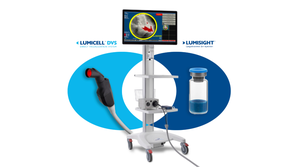NIH will use Abbott’s neuromodulation technologies to explore the devices’ applications for chronic pain and progressive movement disorders, like Parkinson’s disease.
May 14, 2019

Abbott Laboratories and the National Institutes of Health have formed an alliance to evaluate applications that could help treat chronic pain and progressive movement disorders, like Parkinson’s disease.
The collaboration is a part of NIH’s BRAIN (Brain Research through Advancing Innovative Neurotechnologies) initiative to accelerate advancements in neuroscience research. The agreement specifically calls for NIH to use the Abbott Park, IL-based company’s neuromodulation technologies for research related to these NIH initiatives to explore their application for chronic pain and progressive movement disorders, like Parkinson’s disease.
The BRAIN Initiative was launched in 2013 and looks to understand the functions of the human brain by researching and developing new uses for innovative technologies. Recently, the BRAIN Initiative assembled participants from contributing federal agencies, non-federal organizations, as well as members of the media, public, and Congress at its 5th Annual Investigators Meeting in Washington, D.C. The meeting provided a forum for discussing recent scientific developments and potential new directions in brain research and identified areas for collaboration and research coordination.
“For Abbott this is a golden opportunity,” Binith Cheeran, Medical Director in Abbott’s Neuromodulation, told MD+DI. “We want to do [anything we can] with our technology and innovation to support this effort to understand the brain and help people with neurological illnesses.”
Cheeran said Abbott was offering up its entire neuromodulation product line to be used in the BRAIN Initiative. This includes products in deep brain stimulation (DBS), spinal cord stimulation (SCS), and dorsal root ganglion (DRG) therapy.
"The NIH is investigating the application of these devices for the treatment of a wide range of neurological and neuropsychiatric conditions and chronic pain," Nick Langhals, PhD, Program Director for Neural Engineering within the Division of Translational Research at the National Institute of Neurological Disorders and Stroke, said in a release. "The neuromodulation technologies provided by Abbott will help us determine the inner workings of the nervous system to help fill gaps in our current knowledge of the brain and provide opportunities for exploring how the brain interacts with the human body in patients with neurological conditions."
Abbott strengthened its neuromodulation offerings through the acquisition of St. Jude Medical for $25 billion. The company obtained the Proclaim Elite recharge-free SCS system and Prodigy chronic pain system.
Late last year, Abbott received a nod from FDA for the DRG Invisible Trial System. Patients who find adequate pain relief with the company’s DRG Invisible Trial System can then have the Proclaim DRG System implanted.
About the Author(s)
You May Also Like




